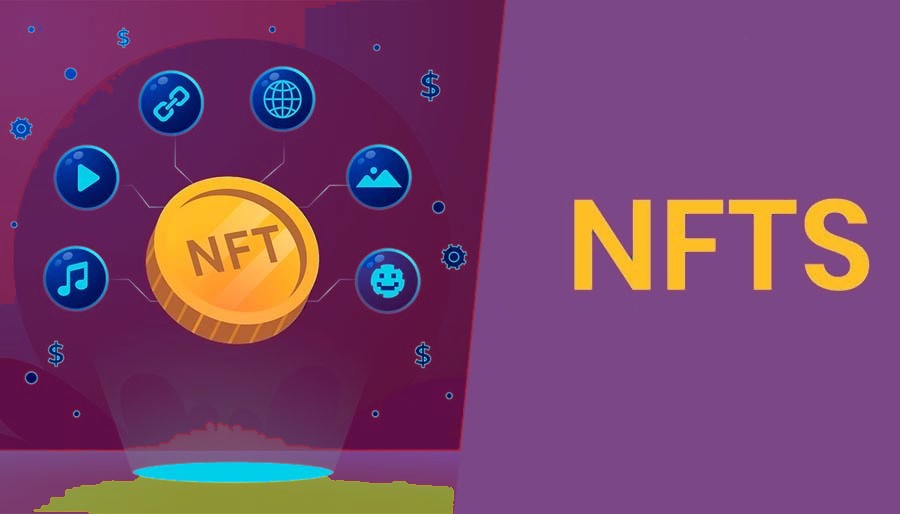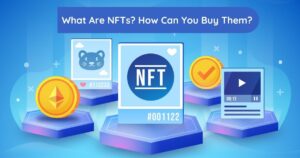NFTs have been around for a while, but they really took off in 2020 and have continued to gain popularity ever since, especially in the field of digital art. Although NFTs have created a lot of enthusiasm, they have also drawn criticism for being erratic, extremely speculative, and susceptible to fraud. We examine what you should know about NFTs in this post.
Definition and meaning of NFT
The acronym for “non-fungible token” is NFT. Something that is non-fungible is one that is special and cannot be replicated. In contrast, cryptocurrencies and fiat money are interchangeable, meaning they may be bought, sold, or otherwise swapped for one another. Each NFT is distinct because it has a digital signature
How are NFTs operated?
Cryptographic assets known as non-fungible tokens, or NTFs, are kept on a blockchain, which is a distributed public ledger that logs transactions. Unique identifying codes on each NFT allow them to be distinguished from one another. It is simple to transfer tokens between owners and confirm ownership using this data.
NFTs may be purchased and sold in the same manner as physical assets, with their value determined by supply and demand in the market. In addition to representing real-world objects like artwork and real estate, NFTs are digital representations of assets.
How are NFTs purchased? Some users believe that tokenizing real-world tangible items in this way can improve the efficiency of purchasing, selling, and trading them while also perhaps lowering the risk of fraud.
How are NFTs purchased?
Because of its high risk and unpredictable highs and lows, even seasoned investors may be put off by the NFT market. If you’re considering purchasing NFTs, it’s critical that you comprehend the procedure. Let’s examine the procedures involved:
Register for a cryptocurrency exchange.
Making an account on a cryptocurrency platform or exchange is the first stepAn online marketplace where various cryptocurrency kinds can be bought and sold is called a crypto exchange. You must register for an account on your preferred platform in order to purchase NFTs. It’s important to investigate several platforms to determine which one best meets your needs in terms of features, costs, and continuing support.
Get a cryptocurrency wallet open.
The keys that allow you to access your digital assets are kept in a cryptocurrency wallet. To access their wallet, users are given a special seed phrase, also known as a recovery phrase. You can’t access your wallet without your seed phrase, therefore it’s critical to keep it secure.
Wallets have two options: they can run independently or be hosted on an exchange.
You still own responsibility for your wallet and private keys if they function on their own. If an exchange hosts your digital wallet, the exchange serves as a middleman for the transmission of cryptocurrency. The business is in charge of safeguarding your assets and is in possession of your private keys.
On the other hand, you need a wallet that is connected to the blockchain directly if you wish to purchase and sell NFTs without the assistance of a third party. This enables the public key to be used for direct money transfers between individuals. Wallets come in two varieties, referred to as “hot” or “cold”:
Popular wallets consist of:
Web-based wallets, software
accessible as an in-browser extension, a desktop or mobile application, or both
Cyberattacks are more likely to occur than with cold wallets.
What are cold wallets?
Although they are thought to be more secure, hardware wallets—physical, non-internet devices—are more prone to loss and don’t have a backup in case you misplace your seed phrase.
Since the Ethereum blockchain is the network on which the majority of NFTs are sold, the cryptocurrency wallet you choose should preferably be able to interact with Ether (ETH, Etherium), which is native to the Ethereum blockchain.
Put Ethereum in a digital wallet.
After choosing an NFT exchange and purchasing ETH, you must move the money to a wallet. Depending on the wallet you use, the exchange you use to purchase ETH, and the market place where you want to trade NFTs, this procedure will alter.
Purchase NFTs
Upon connecting and funding your wallet, you may begin purchasing NFTs. An NFT becomes your property when you purchase it, therefore you effectively become the owner. Other rights to the work, such as the ability to reproduce or modify it, are not granted to the NFT holder unless they are specifically included in the written contract between the buyer and the author. The NFT you bought can be
subject to various limitations from different markets.
- An NFT marketplace: what is it?While the NFT industry is always evolving, most NFT marketplaces fall into one of three categories:
- Open market: NFTs can be bought, sold, or minted by anybody. The process of releasing your token on the blockchain in a unique way so that it may be purchased is known as minting. Although authors can mint their own creations, open markets usually mint NFTs for you.
- Closed marketplace: To participate, artists must submit an application, and the marketplace typically handles the minting procedures. More limitations apply to trading and selling.
- A proprietary marketplace is one where the business running it offers NFTs that are protected by trademarks or copyrights.
- To be informed when there are fresh NFT drops, some NFT traders register and subscribe to accounts on many markets.
- .Along with more specialist investment sites like Rarity Sniper and Rarity Tools, information about new NFTs is also exchanged on Discord and Twitter. Upon the announcement of highly anticipated
- NFTs, investors typically move swiftly.
The majority of marketplaces provide consumers with step-by-step instructions to assist them learn how to utilize them. After making an account on the marketplace, you have to link your wallet to it. Certain marketplaces employ their own proprietary wallet, or you may create one right from within the website. Discounts or a decrease in the extra costs associated with utilizing external wallets may be available when using a marketplace’s private wallet.
NFT marketplace examples
Numerous NFT marketplaces exist. As examples, consider:
Sea Open
OpenSea, one of the biggest NFT markets, provides NFTs in a variety of categories, including collectibles, sports, gaming, music, fashion, and art. Users may also access a variety of educational resources on the website.
NBA Top Shot
Basketball aficionados may swap basketball video clips on this NFT marketplace. NBA Top Shot boasts a sizable fan base, and challenges and competitions provide a social element.
nifty Gateway
Collections from well-known fine art, animation, video, and multi- and mixed-media artists are available at Nifty Gateway. Buyers looking to trade or collect art with long-term worth are the target audience for this website.
Rare
A platform built on Ethereum that makes it easier to create, sell, and acquire ownership rights to digital art using NFTs.
NFT frauds
Scams using NFTs are not unusual. Among the most important ones to be aware of are:
- Phishing scams: False pop-ups and links that advertise new NFT initiatives and drops on social media.
- False social media profiles, marketplace websites, and celebrity impersonators who promote NFT drops and collections are known as “catfishing.”
- False NFTs: Con artists offering for sale other people’s creations under the guise of their own.
- Pump-and-dump schemes: con artists inflate the value of an NFT to drive up its price, then swiftly withdraw their gains, leaving investors with nothing.
- Free mint scams: Con artists get victims to take part in a fraudulent mint by applying intense pressure. But rather than getting a fresh mint, the victim unintentionally gives over control of their money.
How to prevent becoming a victim of an NFT scam:
- Adhere to fundamental cybersecurity protocols, including the use of two-factor authentication and secure passwords.
- Although keeping your cryptocurrency on exchanges is handy, it is better to keep it offline in a cold wallet, which is a physical device that stores your assets and keys.
- Make sure everything is operating as it should by doing a trial transaction with a little quantity of money before investing large amounts of money in NFTs.
- Ignore spam, which includes weird NFTs or direct messages from strangers to your wallet. These messages may include dangerous contracts.
- Do some study on how to protect your cryptocurrency and personal data before purchasing NFTs. To get insight into the industry and associated hazards, read online guides, reviews, and testimonials.
- Our whole post about NFT frauds and how to prevent them can be found here




